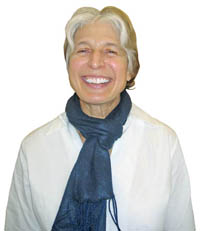AROUND THE QUADS
5 Minutes With ... Chloe Bulinski
Professor of biological studies Chloe Bulinski earned her B.A. in chemistry with
an art history minor at the University of Colorado, then completed her Ph.D. in chemistry
at the University of Wisconsin. Originally from Illinois, she came to the College of Physicians
and Surgeons in 1988, then moved to the Morningside campus in 2000. CCT caught
up with her before the spring semester began to find out more.
Q: Where did you teach before Columbia?
A: My first job was at UCLA, teaching undergraduate biology for six years.
Q: Was it an adjustment to come to Columbia and New York?
A: I like it so much better than L.A. I like the sense of history and a defined city, and here
you feel much more in the center of things. When you see a news report on TV, they are always quoting
a Columbia professor.
Q: What classes are you teaching this semester?
A: Cell biology, an undergraduate course. About 65 percent of the students want to be physicians;
others want to do research, law or policy. Columbia has really remarkably talented students, so it’s
fun.
Q: What is your favorite class to teach?
A: Probably that one, or biological research skills, a supplemental course. It works with two
semesters of independent research, where students are set up with a lab at the medical school to do
research. It is great for undergraduates not only to discover research but also decide maybe not to
be an M.D. I have nothing against M.D.s, but I want it to be a carefully considered choice and not what
their parents want.
Q: What is your research area of expertise?
A: There are beautiful structures called microtubules that are important for cells’ motility
and shape. They are fibers that self-assemble from two-dimensional information in our genes, without
a structural template, and give cells three-dimensional form. Microtubules are important because they
make up the cell division apparatus. Since abnormal cell division causes all sorts of problems, including
cancer, microtubules are the targets of about one-third of cancer treatments.
Q: What are you currently working on?
A: Mechanisms of cell motility, trying to determine if special kinds of microtubules are required
for making adhesions. Imagine trying to walk on an ice rink — it doesn’t work with no adhesion.
Cells have little feet they put down to move, and they self-form them and then they are able to pull
them up again. We’re interested in what’s happening when cells are changing shape or moving.
Q: Where do you live?
A: Just across the George Washington Bridge, in Leonia. I have an enviable commute — 15
minutes to get here from home, and there I have space and a place to grow tomatoes.
Q: Do you have any pets?
A: A dog that my daughter (at Penn in neurobiology) calls her replacement.
Q: What did you last read for fun?
A: During the semester it’s just The New Yorker, The Atlantic and The
New York Times. And I read grants in my backyard hot tub.
Q: Coffee or tea?
A: Coffee — I did my post-doc in Seattle.
Q: What is your favorite place in the world?
A: Tasmania — I’ve only been twice. It’s a great place, a small island with
a lot of wilderness to explore: rainforest and microclimates and beaches. It’s great to look out
at the ocean and know there’s nothing until Antarctica.
Q: If you were not teaching at Columbia, what would you most likely be doing?
A: Probably doing research. I was a research technician as an undergrad because I ran away
from home as a freshman and I had to pay for school. It was an era when everyone ran away from home,
but I was lucky! The silver lining was that by the time of a rapprochement with my parents (we’re
now in close contact), I had been mentored by lab co-workers who repositioned my interest from chemistry
toward a career in molecular and cellular biology.
Photo and interview: Laura Butchy ’04 Arts
|




